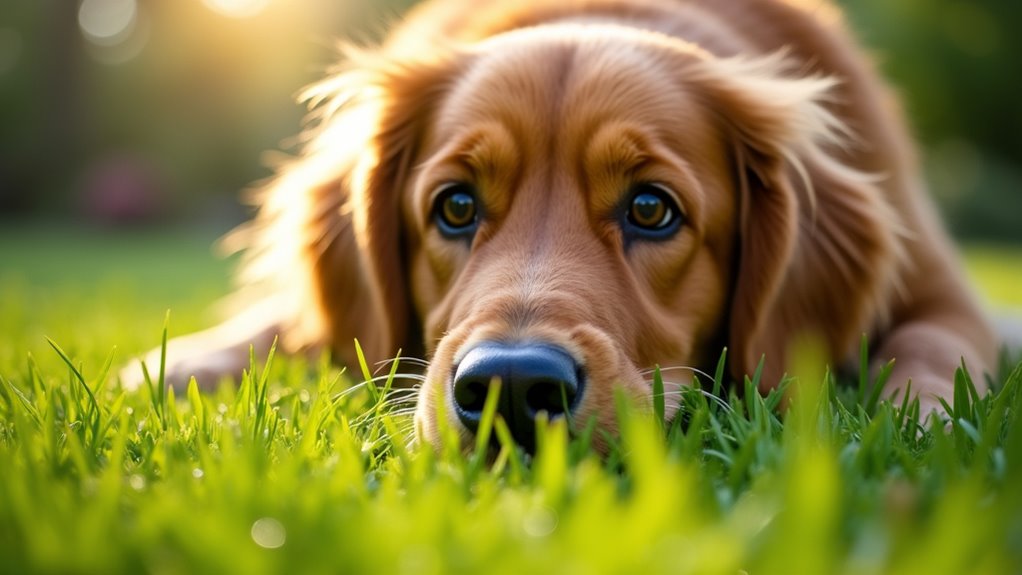Dogs eat grass for several reasons. They might be trying to get missing nutrients, soothe an upset stomach, or simply enjoy the taste and texture. Sometimes, grass-eating is a sign of dietary gaps or boredom. Most of the time, it’s harmless, but you should watch out for signs of illness or chemicals. To understand your dog better and keep them safe, exploring the reasons behind this habit can be helpful.
Key Takeaways
- Dogs may eat grass to compensate for missing nutrients or fiber in their diet.
- Grass-eating can soothe stomach upset or act as a natural remedy.
- Most grass is safe, but chemically treated lawns can be toxic and cause health issues.
- Increased grass consumption might indicate nausea or internal discomfort.
- Normal grass-eating is common, but monitoring and a balanced diet help minimize unnecessary behavior.

Have you ever wondered why dogs eat grass? It’s a common behavior that leaves many dog owners scratching their heads. While it might seem strange, understanding your dog’s motivations can help you determine if it’s harmless or something to watch more closely. One reason dogs eat grass relates to their nutritional needs. Sometimes, dogs seek out grass because they’re missing certain nutrients in their diet. For example, if their food doesn’t contain enough fiber, they might nibble on grass to help with digestion or to soothe an upset stomach. Grass can act as a natural remedy, providing roughage that their bodies crave when they’re feeling off. Additionally, some dogs simply enjoy the taste or texture of grass, which can be a pleasurable snack for them.
Another important factor to contemplate is grass toxicity. While most grass is safe for dogs, certain types can be toxic if ingested. Pesticide-treated or chemically sprayed grass can pose health risks, leading to symptoms like vomiting, diarrhea, or even more serious poisoning. As a responsible pet owner, you should be mindful of where your dog is munching and avoid areas that might have harmful chemicals. If you notice your dog eating grass excessively or showing signs of distress afterward, it’s wise to consult your vet to rule out any underlying health issues or potential toxicity.
Most grass is safe, but chemical-treated lawns can be toxic; watch your dog’s grass-eating habits carefully.
Sometimes, dogs eat grass because they’re feeling nauseous or unwell. It’s a natural instinct to try to induce vomiting to relieve stomach discomfort. If your dog suddenly starts grazing on grass more than usual, it might be a sign that something isn’t right internally. It’s also worth noting that some dogs develop a habit of grass-eating, which can persist regardless of their health status. A further reason could be that their diet lacks certain nutrients, prompting them to seek them out in natural sources like grass. Moreover, research suggests that behavioral factors can influence grass-eating, as some dogs may do so out of boredom or stress. However, it’s not always a cause for alarm—some dogs just develop a habit or find grass to be a tasty snack. It’s essential to keep an eye on their overall health and behavior. If they’re also showing other symptoms like lethargy, loss of appetite, or vomiting, it’s best to seek veterinary advice promptly.
In most cases, grass-eating is a normal behavior that doesn’t indicate a serious problem. Just ensure that your dog has a well-balanced diet that meets their nutritional needs, which can reduce the urge to seek out grass for nutrients. Also, watch out for grass toxicity by keeping them away from chemically treated lawns. When in doubt, consulting your vet can give you peace of mind and help you better understand your dog’s habits. Remember, dogs are individuals, and their reasons for eating grass can vary, but with attentive care, you can keep your furry friend happy and healthy.
A helpful approach is to observe if your dog’s grass-eating coincides with other signs of dietary deficiency or health issues, which could indicate a nutritional imbalance.
Frequently Asked Questions
Can Eating Grass Indicate Health Problems in Dogs?
Eating grass can sometimes indicate health issues in your dog, like dietary deficiencies or behavioral boredom. If your dog eats grass excessively, it might be trying to soothe an upset stomach or compensate for missing nutrients. Keep an eye on their overall health, and make certain they have a balanced diet and enough mental stimulation. If the behavior persists or is accompanied by other symptoms, consult your vet for a thorough check-up.
Do Certain Dog Breeds Prefer Eating Grass More Than Others?
You might wonder if certain breeds prefer eating grass more. Breed tendencies influence dietary preferences, so some dogs, like Labrador Retrievers and Beagles, naturally have a higher tendency to munch on grass. These behaviors are often instinctual or related to their history as hunting or herding dogs. While individual preferences vary, understanding breed tendencies helps you better interpret your dog’s eating habits and guarantees their diet meets their needs.
How Can I Discourage My Dog From Eating Grass?
To discourage your dog from eating grass, you should focus on behavior modification and training techniques. Start by redirecting their attention with commands like “leave it” or offering a toy whenever they go for grass. Consistent reinforcement of good behavior helps. Keep your dog well-exercised and guarantee they’re getting enough mental stimulation, which reduces boredom-driven grass eating. Patience and positive reinforcement are key to changing this habit.
Is Eating Grass Safe for Puppies?
You might wonder if eating grass is safe for puppies. Generally, small amounts of grass aren’t harmful and can aid in grass digestion. It’s part of dog nutrition that helps soothe stomach issues or fulfill natural instincts. However, always monitor your puppy to guarantee they don’t ingest harmful chemicals or pesticides. If you’re concerned, consult your vet to ensure this behavior complements their health and development.
Does Grass-Eating Affect a Dog’S Digestion?
You might wonder if grass-eating affects your dog’s digestion. Eating grass can help with grass digestion by inducing vomiting if they feel unwell or aiding in digestion. It’s often a harmless part of their diet impact, but excessive consumption could indicate dietary deficiencies or stomach upset. Keep an eye on their behavior, and consult your vet if you notice persistent grass-eating, to guarantee it’s safe and beneficial for your dog.
Conclusion
So, next time your pup munches on grass, remember it’s a natural, nourishing habit. Whether it’s for digestion, boredom, or just because it’s there, this curious canine custom is common and confusing. By understanding their instinctive inclinations, you can better support your furry friend’s health and happiness. Embrace this grassy habit with patience and perspective, knowing it’s simply part of a dog’s delightful, digestive dance in the daily dance of life.









